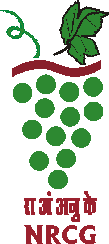Introduction
Grape is one of the important fresh fruit being exported to European Union countries besides the countries of Middle East and the Far East. Pesticide residue in the grapes is one of the quality parameters before the importers in importing countries to accept the produce. In 2003-04, the Indian grapes exported to European Union countries faced a complete ban due to presence of pesticide residues above the prescribed EU-MRL level. As a corrective action, EU authority has advised India to establish a traceability monitoring system of control of pesticide residues in grapes for further initiation of grape export to EU. As a repercussion to this, APEDA, Ministry of Commerce recognized ICAR-NRC for Grapes as the National Referral Laboratory (NRL) to establish traceability system for control pesticide residues in table grapes for export.
Due to this centre’s dedicated services as National Referral Laboratory, the export of table grapes to EU restarted in 2004-05 and it improved significantly. At domestic level, the MRL non-compliance of fresh grapes for export to EU countries has reduced from 24% in 2004 to around 2-3 % in the recent years. Thus, there is a significant increase in MRL compliance due to the active role played by the ICAR-NRC Grapes as the National Referral Laboratory. This effect has also created a positive influence on the total export of fresh grapes from India, which has been increased from INR 105.89 crores in 2003-2004 just before implementation of the residue monitoring system to the current value of INR 3460.70 Crores in 2023-24. Further, the official control of pesticide residues in grape has been extended to other export markets other than EU such as Russia, China, GCC, Indonesia, Canada etc. in the same line. This residue monitoring in export grapes has created awareness among domestic market as well and the centre initiated a “zero residue grape” program for domestic market since 2017-18 for better price realization for growers. As an overall consequence of this, the export has increased significantly over several years and the growers got a better price realization for their produce both at export and domestic market. On successful implementation of Residue Monitoring Plan in grape, the model was extended by APEDA to all other fruits and vegetables for monitoring pesticide residues and in peanut and peanut products for monitoring aflatoxins with ICAR-NRCG being the National referral Laboratory.
Objectives
- To establish the surveillance system for monitoring pesticide residues in grapes and other agricultural commodities exported to EU and Non-EU countries.
- To establish the surveillance system for monitoring aflatoxins residues in peanut and peanut products exported to EU and Non-EU countries.
Scope
All grape farmers, farms & plots intending to produce grapes for export to the European Union and Non-EU, exporters, APEDA recognized pack houses, APEDA recognized laboratories authorized for sampling, analysis and grading of grapes and personnel engaged by them, ICAR-NRC Grapes, Central Insecticide Board, DMI, respective State Government departments of Agriculture/Horticulture, Indian Council of Agriculture Research (ICAR) and any other agencies/ stakeholders including extension providers in any form to the farmers, producers and exporters cultivating crops for exports shall get covered under this
Responsibilities of the NRL
- The NRL shall develop, specify and verify method of sampling and analysis to the APEDA recognized laboratories authorized for sampling and analysis.
- The NRL shall prepare the recommended list of chemicals to be used for cultivation of grapes given in Annexure-5 before commencement of the grape cultivation season every year.
- The NRL shall prescribe the list of chemicals and their MRLs (Annexure 9) for the purpose of testing before commencement of the season every year.
- The NRL shall make recommendations to APEDA for authorization of the laboratories for sampling, analysis in every year based on onsite assessment and performance of the laboratories in Proficiency Testing Program/Inter Lab Comparison organized by NRL.
- The NRL shall monitor the work of authorized laboratories by conducting surveillance audit to ascertain that they are following the criteria.
- The NRL shall draw and analyze 5% of the samples directly from the recognized packhorses /laboratories/fields pertaining to the batches tested by the designated laboratories as a measure of conformity.
- The NRL shall organize training on testing of each residue or groups of residues for authorized laboratories.
- NRL shall organize inter-laboratory/proficiency testing programs in various fruits and vegetables for pesticide residues and in peanut for aflatoxins.
- Upon receipt of an alert notice from authorized laboratory about a failed sample, the NRL shall, without delay, issue an Internal Alert Information to the State Government, exporters, PSC issuing authorities, Laboratories and APEDA under intimation to the farmer in respect of the farms in case of detection of higher residues.
- The NRL shall organize interactive meetings of stakeholders on a regular basis. Participants in these meetings shall include farmers, exporters, CIB&RC, Agriculture/Horticulture Officers, PSC issuing authorities, Agmark officials, ICAR, any other service providers such as agro chemical producers and suppliers and APEDA.
- Read more

